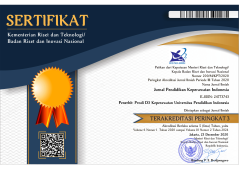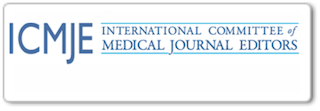The Adversity Quotient of the Lecturer Faculty of Nursing, Universitas Padjadjaran in Pandemic COVID-19
Abstract
The emergence of various obstacles and challenges during the COVID-19 pandemic can affect the performance of lecturers in carrying out their duties. The dversity quotient is one of the factors that supports one's success in improving one's performance, so measuring the adversity quotient is the first step to discover lecturers' ability to face obstacles and challenges. This study aims to describe the level of adversity quotient for lecturers at the Faculty of Nursing, Universitas Padjadjaran during the COVID-19 pandemic. This study uses a quantitative descriptive method. The subjects studied were 39 nursing faculty lecturers. The instrument used is ARP (Adversity Response Profile) Quick Take TM modified with 40 statement items. The results showed that 23 people (59%) were at the camper-to-climber transition level, two people (5%) were at the camper level, and 14 people (36%) were at the climber level. Based on the sub-dimensions, it is known that the dimensions with the lowest and lowest average values are origin and ownership (37.41) and control (42.53). Lecturers must increase the adversity quotient to help control the challenges they face better. Efforts that can be made are by studying and practicing the LEAD method (Listen, Explore, Analyze, Do). With a good level of adversity quotient, it is hoped that lecturers will be more prepared and maximal in completing assignments, especially related to learning.
Keywords
Full Text:
PDFReferences
Adiawaty, S. (2020). Pandemi covid-19 dan Kinerja Dosen (Study Kasus Kinerja Dosen pada PT xyz). Esensi: Jurnal Manajemen Bisnis, 23(2), 185-191.
Afriani M, H. R. (2021). An Overview of Teaching Motivation for Junior High School Teachers During the Covid-19 Pandemic. Psychodimensia, 20 (1), 76–85.
Aji, W. K., Ardin, H., & Arifin, M. A. (2020). Blended learning during pandemic corona virus: Teachers’ and students’ perceptions. IDEAS: Journal on English Language Teaching and Learning, Linguistics and Literature, 8(2), 632-646.
Blonder, R., Feldman-Maggor, Y., & Rap, S. (2022). What can be learned from lecturers’ knowledge and self-efficacy for online teaching during the Covid-19 pandemic to promote online teaching in higher education. PloS one, 17(10), 1-20.
Cleland, J., McKimm, J., Fuller, R., Taylor, D., Janczukowicz, J., & Gibbs, T. (2020). Adapting to the impact of COVID-19: Sharing stories, sharing practice. Medical teacher, 42(7), 772-775.
Feldhammer-Kahr, M., Tulis, M., Leen-Thomele, E., Dreisiebner, S., Macher, D., Arendasy, M., & Paechter, M. (2021). It’sa challenge, not a threat: Lecturers’ satisfaction during the COVID-19 summer semester of 2020. Frontiers in Psychology, 12, 1-10.
Feldman-Maggor, Y., Rom, A., & Tuvi-Arad, I. (2016). Integration of open educational resources in undergraduate chemistry teaching–a mapping tool and lecturers' considerations. Chemistry Education Research and Practice, 17(2), 283-295.
Firmansyah, F., & Bandono, A. (2022). Motivating Teachers During the COVID-19 Pandemic. KnE Social Sciences, 506-516.
Furukawa, P. D. O., Cunha, I. C. K. O., Pedreira, M. D. L. G., & Marck, P. B. (2017). Características dos profissionais de enfermagem e a prática de ações ecologicamente sustentáveis nos processos de medicação1. Revista Latino-Americana de Enfermagem, 25. 1-10.
Hase, A., O'Brien, J., Moore, L. J., & Freeman, P. (2019). The relationship between challenge and threat states and performance: A systematic review. Sport, Exercise, and Performance Psychology, 8(2), 123-129.
Hong, S. B. (2020). An Analysis on the Relationships of Tax Official’s Adversity Quotient Factor with Their Resilience and Job Performance. World Journal of Accounting, Finance and Engineering, 4(1), 35-40.
Naidu, K., & Modise, M. E. P. (2021). Lecturers’ Experiences of the Blurring of Time and Space during Covid-19 in a South African ODeL University. UnisaRxiv.1-15.
Kumar, J. (2023). Influence of motivation on teachers’ job performance. Humanities and Social Sciences Communications, 10(1), 1-11.
Umbara, I. G. N. M. (2019). Upaya Meningkatkan Kinerja Guru Produktif dalam Melaksanakan Pembelajaran Membatik pada Program Keahlian Desain dan Produksi Kria Tekstil melalui Pembinaan Kompetensi Profesional. Jurnal Pedagogi dan Pembelajaran, 2(1), 1-8.
Manurung, A. (2021). Hubungan Karakteristik Dosen, Pola Asuh Orangtua, dan Peer Group dengan Konsep Diri Self Esteem Remaja. Jurnal Keperawatan Jiwa, 9(1), 61-68.
Mayangsari, M. (2021). The Importance Of Adversity Quotient And Spiritual Quotient Capabilities For Consistent Performance Of Educators. AKADEMIK: Jurnal Mahasiswa Humanis, 1(3), 114-122.
Mayudana, I. K. Y. (2020). Hubungan kecemasan matematis dan adversity quotient terhadap hasil belajar matematika siswa kelas X SMK TI Bali Global Denpasar tahun pelajaran 2019/2020. Widyadari, 21(2), 544-555.
Miguel, C., Castro, L., Marques dos Santos, J. P., Serrão, C., & Duarte, I. (2021). Impact of COVID-19 on medicine lecturers’ mental health and emergency remote teaching challenges. International Journal of Environmental Research and Public Health, 18(13), 1-18.
Mishra, L., Gupta, T., & Shree, A. (2020). Online teaching-learning in higher education during lockdown period of COVID-19 pandemic. International journal of educational research open, 1, 100012. 1-10.
Rokhani, C. T. S. (2020). Pengaruh Work From Home (WFH) Terhadap Kinerja Guru SD Negeri Dengkek 01 Pati Selama Masa Pandemi Covid-19. EduPsyCouns: Journal of Education, Psychology and Counseling, 2(1), 424-437.
Runtu, D., Aldrin, N., & Merdiaty, N. (2019). Effect of work ethics on job performance with adversity quotient as a mediator: Work Ethics on Job Performance with Adversity Quotient. International Journal of Research in Business and Social Science (2147-4478), 8(5), 98-103.
Santiari, L. P., Sunu, I. G. K. A., & Dantes, K. R. (2020). Kontribusi kepemimpinan kepala sekolah, iklim kerja, dan motivasi kerja terhadap kinerja guru. Jurnal Administrasi Pendidikan Indonesia, 11(1), 1-10.
Saragih, S., Markus, T., Rhian, P., & Setiawan, S. (2021). Eksplorasi kesiapan dosen dan mahasiswa menjalani pembelajaran jarak jauh di masa pandemi covid-19. Kwangsan, 9(1), 124-141.
Shrestha, E., Mehta, R. S., Mandal, G., Chaudhary, K., & Pradhan, N. (2019). Perception of the learning environment among the students in a nursing college in Eastern Nepal. BMC medical education, 19, 1-7.
Simamora, R. M., De Fretes, D., Purba, E. D., & Pasaribu, D. (2020). Practices, challenges, and prospects of online learning during Covid-19 pandemic in higher education: Lecturer perspectives. Studies in Learning and Teaching, 1(3), 185-208.
Sofyana, L., & Rozaq, A. (2019). Pembelajaran daring kombinasi berbasis whatsapp pada kelas karyawan prodi teknik informatika universitas pgri madiun. Jurnal Nasional Pendidikan Teknik Informatika: JANAPATI, 8(1), 81-86.
Uphill, M. A., Rossato, C. J., Swain, J., & O’Driscoll, J. (2019). Challenge and threat: A critical review of the literature and an alternative conceptualization. Frontiers in psychology, 10, 1-12.
Wang, X., Liu, M., Tee, S., & Dai, H. (2021). Analysis of adversity quotient of nursing students in Macao: A cross-section and correlation study. International Journal of Nursing Sciences, 8(2), 204-209.
Widodo, W., Gustari, I., & Chandrawaty, C. (2022). Adversity quotient promotes teachers’ professional competence more strongly than emotional intelligence: Evidence from Indonesia. Journal of Intelligence, 10(3), 44.1-11.
Zhao, Y., Sang, B., & Ding, C. (2021). The roles of emotional intelligence and adversity quotient in life satisfaction. Current Psychology, 1-10.
DOI: https://doi.org/10.17509/jpki.v9i1.55692
Refbacks
- There are currently no refbacks.
Jurnal Pendidikan Keperawatan Indonesia(JPKI) published by Indonesia University of Education. JPKI is licensed under a Creative Commons Attribution-ShareAlike 4.0 International License.
Office :
Nursing Department. FPOK UPI.
229, Dr. Setiabudhi Street. Bandung 40154
West Java , Indonesia
E-mail : jpki@upi.edu

_.png)
_.png)
_.png)











